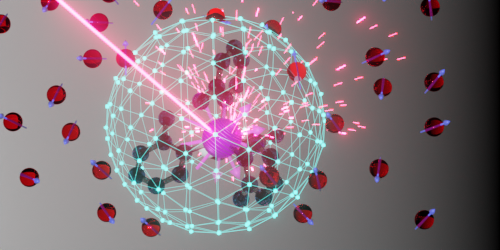Shielding Qubits with Chemistry
Qubits made from molecules are versatile quantum-technology systems that can be chemically engineered for a wide variety of applications. Now David Awschalom from the University of Chicago and colleagues have identified a way of manipulating the spin states of the molecular qubits by placing them in an asymmetric chemical environment [1]. The resulting spin states are more stable against noise from fluctuating magnetic fields than those in symmetric environments.
The molecular qubit used by the team consists of a chromium atom—where the spin is localized—surrounded by chemical groups (or “ligands”) that generate a light-responsive electronic structure in the atom’s spin state. As such, the qubit’s spin can be controlled and read out with light, a desirable capability that has been widely investigated in other qubit systems (see Synopsis: Vetting Neutral Nitrogen Vacancies). But molecular qubits are unique in that researchers can insert them into different chemical settings. “A key advantage of these molecular systems is that the qubit is self-contained within a molecule and so can be deployed in different host environments,” Awschalom explains.
In previous experiments, the molecular qubits were housed within a crystal array of host molecules that had the same structure as the qubits. Awschalom and colleagues instead used host molecules with a slightly different structure, resulting in an asymmetric environment around each qubit. The asymmetry made the qubits less sensitive to the magnetic fields coming from nearby nuclear spins. The coherence time—how long the qubits stay in a spin state—was measured to be 10 µs, compared to 2 µs for molecular qubits in a symmetric host environment. Awschalom says these qubits might find use in detecting electric fields in biological samples and in other noisy settings.
–Michael Schirber
Michael Schirber is a Corresponding Editor for Physics Magazine based in Lyon, France.
References
- S. L. Bayliss et al., “Enhancing spin coherence in optically addressable molecular qubits through host-matrix control,” Phys. Rev. X 12, 031028 (2022).




